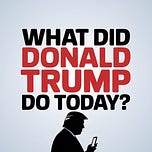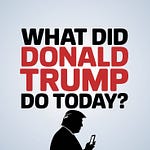The collection of Donald Trump’s Truth Social posts and recent administrative actions reveals a pattern of authoritarian rhetoric, legal overreach, political retaliation, and misinformation spanning domestic, cultural, economic, and foreign policy. His posts attack transgender athletes, propose illegal interventions in state sports, and threaten to withhold federal funds—none of which have legal grounding. On trade, Trump touts a 50% tariff on the EU as a personal triumph while ignoring economic consequences and constitutional limits on executive trade authority. His vague statements about Vladimir Putin and national security lack substance or strategic clarity.
Trump’s domestic policy posts often shift from commemorative to combative, using institutions like the U.S. Border Patrol or Harvard University as platforms for partisan attacks. His mocked “offer” to make Canada the 51st state, reflections on fishing rights in Maine, and false claims about environmental protections are all framed to promote personal loyalty and cultural grievance, rather than policy coherence. In Alaska, he reduces governance to sycophancy, tying economic prosperity to personal allegiance. His conspiracy-tinged post about the presidential autopen—claiming it was used to enact policies without Biden’s consent—underscores his continued efforts to delegitimize institutional processes.
Trump’s pardon of Todd and Julie Chrisley, convicted of fraud and tax evasion, fits a broader pattern of clemency for political allies or figures associated with conservative causes. It follows similar pardons of controversial individuals, including a sheriff and a healthcare executive, reinforcing Trump’s use of presidential powers for political messaging rather than justice.
On immigration and academic policy, the administration’s attempts to deport immigrants to third countries without due process were repeatedly blocked by courts. Judge Brian Murphy condemned the government’s misrepresentations and emphasized constitutional protections. Likewise, the administration’s temporary freeze on student visa appointments and its expanded social media vetting have been criticized as ideologically driven, vague, and legally dubious, risking civil liberties and America’s global academic standing.
Trump’s efforts to defund Harvard and target NPR and PBS also reflect an escalating campaign to punish perceived ideological enemies. The administration’s orders to halt funding are viewed as retaliatory and unconstitutional, aiming to chill dissent and silence media criticism under the guise of administrative oversight.
Federal courts have rebuked several of these executive actions, including an order targeting the law firm WilmerHale over its ties to Robert Mueller, declaring them violations of judicial independence. Similarly, a judge blocked efforts to penalize New York’s congestion pricing system, calling the administration’s actions retaliatory and unjustified.
Trump’s posts and policies reflect a governance style driven by grievance, spectacle, and personal loyalty tests. They sideline legal norms and democratic principles in favor of emotional appeals, disinformation, and political punishment, undermining the institutional integrity of the judiciary, media, academia, and immigration system.













Share this post